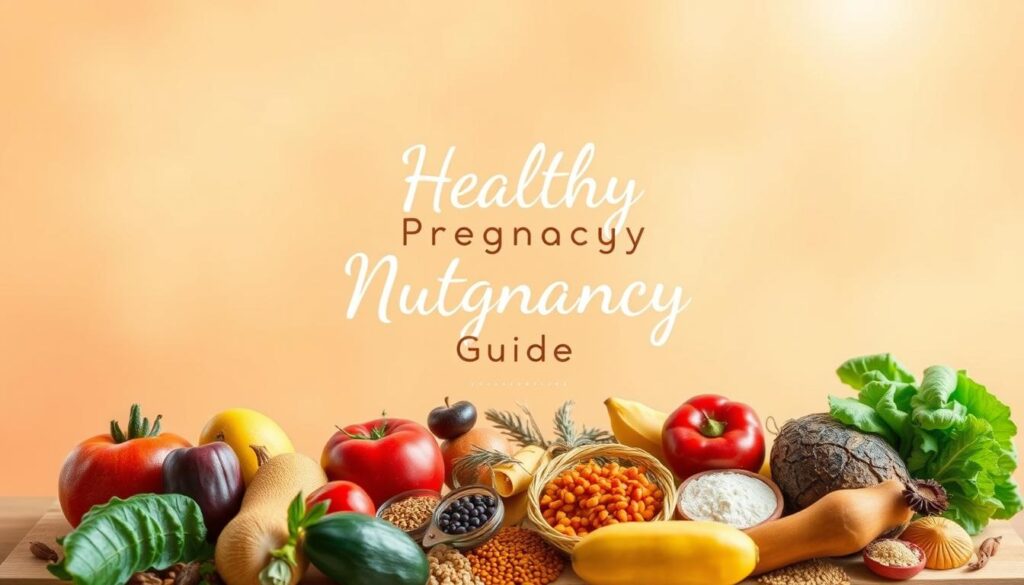Did you know that what a pregnant woman eats can affect her baby’s health for years? Studies show that the food a woman eats during pregnancy is key to her baby’s development. This makes finding the best diet for pregnant women very important.
This guide will help expectant mothers learn how to eat right for themselves and their babies. We know pregnancy brings special nutritional needs and chances. We aim to give you clear, helpful advice.
We’ll cover all you need to know about prenatal nutrition. You’ll learn about important nutrients and how to make balanced meals. Our goal is to help you make choices that support your health and your baby’s growth.
Our guide combines expert advice with easy meal-planning tips. It’s for anyone expecting a baby, whether it’s your first or you’re adding to your family. It will be your go-to for making healthy food choices during pregnancy.
Why Nutrition Matters During Pregnancy
Pregnancy is a big change that needs careful planning of what we eat. Our food choices are key to keeping mom and baby healthy. It’s important to know how food affects the baby’s growth.

Good food during pregnancy helps with weight gain and keeps mom healthy. The body needs different nutrients at different times to help the baby grow right.
The Connection Between Food and Fetal Development
Every meal is important when you’re pregnant. The food you eat helps your baby grow, from their brain to their organs. Food guidelines for pregnancy focus on key nutrients:
- Providing essential building blocks for cellular growth
- Supporting neurological development
- Establishing a strong immune foundation
- Preventing potential developmental complications
Common Nutrient Deficiencies in Pregnant Women
Many pregnant women don’t get all the nutrients they need. This can affect their health and their baby’s growth. We’ve found some important nutrients to focus on:
| Nutrient | Potential Impact | Recommended Daily Intake |
|---|---|---|
| Folic Acid | Neural tube defect prevention | 400-800 mcg |
| Iron | Preventing anemia | 27 mg |
| Calcium | Bone development | 1000 mg |
| Vitamin D | Immune system support | 600 IU |
Knowing these nutritional needs helps us avoid shortages. This supports a healthy pregnancy for everyone involved.
Key Nutrients Every Pregnant Woman Needs

Creating a balanced diet for expectant mothers is key. It supports both mom’s health and baby’s growth. Our bodies change a lot during pregnancy, so we need to eat smart.
Pregnancy superfoods are vital for getting the right nutrients. Let’s look at the main nutrients that are essential for both mom and baby:
- Folate: It helps prevent neural tube defects
- Iron: It keeps blood volume up and prevents anemia
- Calcium: It builds strong bones and teeth
- Protein: It helps with tissue growth and repair
- Vitamin D: It helps the body absorb calcium
Now, let’s get into these nutrients. Each one is important for your pregnancy. We aim to help you make a nutrition plan that’s good for you and your baby.
Good meals for mom and baby should include whole foods. Think lean proteins, leafy greens, dairy, and fortified grains. These foods can help you get the nutrients you need.
Keep in mind, every pregnancy is different. While these tips are a good start, talking to a healthcare professional can make your diet plan even better.
Folic Acid: Brain and Spine Protection

Protecting your baby’s brain and spine starts with knowing how important folic acid is. When planning meals for pregnancy, focus on this key nutrient. It’s vital for the early growth of your baby’s brain and spine.
The Mayo Clinic stresses how crucial folic acid is to prevent serious birth defects. Our guide on nutrition during pregnancy suggests making this vitamin a top priority. It’s essential for your baby’s brain and spinal health.
Pregnant women need 400-800 micrograms of folic acid every day. Foods rich in folate include:
| Food Source | Folate Content (mcg) |
|---|---|
| Spinach (1 cup) | 263 |
| Fortified cereals (1 serving) | 400 |
| Lentils (1/2 cup) | 179 |
| Oranges (1 medium) | 40 |
Pro tip: Start taking folic acid supplements before conception and continue through the first trimester to maximize protection for your developing baby.
While diet is important, many doctors suggest supplements to meet the daily needs. Talk to your healthcare provider about the best prenatal vitamins for you.
Iron: Preventing Anemia and Supporting Growth

Iron is key for both mom and baby during pregnancy. It’s a must-have nutrient in a balanced diet for expectant mothers.
Pregnant women need more iron to support their growing babies. The Mayo Clinic says they should get 27 milligrams of iron every day. This is almost double what non-pregnant women need.
Why Iron Matters
We suggest adding iron-rich foods to your meals. This is part of our plan to help expectant mothers stay healthy.
Top Iron-Rich Food Sources
| Food Source | Iron Content (mg per serving) |
|---|---|
| Lean Red Meat | 2.7 |
| Spinach | 3.2 |
| Fortified Cereals | 18.0 |
| Lentils | 3.3 |
Pro tip: Pair iron-rich foods with vitamin C sources like citrus fruits to enhance absorption!
Talking to your healthcare provider is a good idea. They can help you figure out how much iron you need during pregnancy.
Calcium and Vitamin D: Bone and Teeth Health

During pregnancy, calcium and vitamin D are key for both mom and baby’s bones. They help your baby’s bones grow strong and keep yours healthy too.
The Mayo Clinic says pregnant women need 1,000 milligrams of calcium and 600 units of vitamin D each day. This helps your baby’s bones and teeth grow well.
- Safe foods to eat while pregnant that are rich in calcium include:
- Low-fat dairy products
- Fortified plant-based milks
- Dark leafy green vegetables
- Calcium-set tofu
Vitamin D helps your body use calcium better. It’s important to eat foods with vitamin D while you’re pregnant. Your body also makes vitamin D when you’re in the sun.
- Top vitamin D sources include:
- Fatty fish like salmon
- Egg yolks
- Fortified dairy products
- Sunlight exposure (with proper protection)
Stay away from too much caffeine and high-phosphorus sodas. They can hurt how well your body absorbs calcium. Talk to your doctor about taking supplements if you need to.
Pro tip: Spread your calcium intake throughout the day for better absorption and to support your baby’s bone and teeth development.
Protein: Building Blocks for Your Baby

Protein is key for your baby’s growth in the womb. It helps build the cells, tissues, and organs your baby needs.
The Academy of Nutrition and Dietetics says pregnant women should eat protein every day. You need more protein to keep you and your baby healthy.
- Lean meat provides high-quality protein and essential amino acids
- Eggs offer versatile protein with important nutrients
- Beans and legumes deliver plant-based protein options
- Fish (when low in mercury) supports brain development
Managing pregnancy cravings means choosing protein-rich snacks. These snacks help keep your blood sugar stable and give you energy. Greek yogurt, nuts, and hard-boiled eggs are great for quick energy.
Vegetarian and vegan moms can get enough protein from:
- Tofu and tempeh
- Quinoa
- Lentils
- Protein powders designed for pregnancy
When avoiding foods to limit, focus on lean protein. Try to eat 71 grams of protein a day. Spread it out in your meals and snacks for your baby’s best growth.
Omega-3 Fatty Acids: Brain and Vision Development

Omega-3 fatty acids are key in your diet during pregnancy. They give your baby the nutrients needed for brain and vision growth. It’s important to know about these nutrients when planning meals for your pregnancy.
Omega-3s do more than just feed your body. They help your baby’s brain and eyes grow strong. They help build brain cells and improve thinking skills. They also help your baby’s eyes develop well.
- Essential omega-3 types include DHA and EPA
- Supports fetal brain cell formation
- Contributes to visual system development
- Helps prevent potential developmental challenges
To get enough omega-3s, you need to plan your meals carefully. The NHS says to eat two fish meals a week. Make sure one of them is oily fish.
| Omega-3 Food Sources | Serving Size | Omega-3 Content |
|---|---|---|
| Salmon | 3 oz | 1.5g |
| Sardines | 3 oz | 1.2g |
| Chia Seeds | 1 oz | 5g |
| Walnuts | 1 oz | 2.5g |
If you don’t eat fish, don’t worry. Plant-based foods like flaxseeds, chia seeds, and walnuts are great sources of omega-3s. Talking to your doctor about supplements can help make your diet even better.
Fiber: Supporting Digestive Health

Managing digestive health during pregnancy can be tough. Our guide for moms-to-be shows how important fiber is. It helps keep your digestion comfortable and healthy throughout your pregnancy.
The Academy of Nutrition and Dietetics suggests a high-fiber diet for pregnant women. Fiber acts as a digestive friend, helping to avoid constipation and supporting your gut health. It’s key for your trimester-specific diets.
- Prevents constipation and hemorrhoids
- Regulates blood sugar levels
- Supports healthy weight management
- Promotes consistent digestive function
Your meals during pregnancy should have lots of fiber. Try to eat:
- Whole grains like quinoa and brown rice
- Fresh fruits such as berries and apples
- Legumes including beans and lentils
- Vegetables like broccoli and sweet potatoes
Begin adding more fiber slowly. Also, drink lots of water to help your body digest the fiber. Talk to your healthcare provider about what’s best for your pregnancy.
What an Ideal Pregnancy Diet Looks Like
Figuring out what to eat during pregnancy can seem tough. But, making a balanced diet is easier than you think. Our guide will show you the key parts of a healthy diet for you and your baby.

Best Foods to Include in Your Daily Meals
A good pregnancy diet includes foods rich in nutrients. These foods help your baby grow and keep you healthy. Here are the main foods to eat:
- Lean proteins (chicken, fish, legumes)
- Whole grains
- Fresh fruits and vegetables
- Dairy or calcium-fortified alternatives
- Nuts and seeds
Foods to Avoid During Pregnancy
Some foods can be harmful during pregnancy. It’s important to avoid them. Our advice follows national health guidelines:
| Food Category | Specific Items to Avoid | Potential Risks |
|---|---|---|
| Raw or Undercooked Foods | Sushi, raw eggs, unpasteurized cheese | Bacterial contamination |
| High-Mercury Fish | Shark, swordfish, king mackerel | Potential neurological damage |
| Processed Meats | Deli meats, hot dogs | Listeria risk |
Safe Caffeine & Hydration Guidelines
It’s important to watch your caffeine intake and drink enough water. Limit caffeine to 200mg daily (about one 12-ounce cup of coffee). Also, drink at least 8-10 glasses of water a day to keep your body healthy.
Every pregnancy is different. Always talk to your healthcare provider. They can help make a diet plan that’s right for you.
Sample Pregnancy Meal Plan: Week at a Glance
Creating balanced meals for pregnancy needs careful planning. Our meal guide helps you nourish yourself and your baby. It’s an exciting journey.
Nutrition in pregnancy is more than just eating more. The Academy of Nutrition and Dietetics suggests eating small, frequent meals. This helps with nausea and keeps blood sugar stable.
Daily Meal Timing & Frequency Tips
Knowing about prenatal vitamins and meal times can change your nutrition plan. Here’s what we suggest:
- Eat 5-6 smaller meals instead of 3 large ones
- Space meals every 2-3 hours
- Include protein with each meal
- Stay hydrated between meals
7-Day Healthy Pregnancy Meal Plan
Our meal plan is packed with nutrient-rich foods for you and your baby. Each day is designed to meet your nutritional needs.
| Day | Breakfast | Lunch | Dinner | Key Nutrients |
|---|---|---|---|---|
| Monday | Spinach omelet | Quinoa salad | Grilled salmon | Folate, Protein, Omega-3 |
| Tuesday | Greek yogurt parfait | Lentil soup | Chicken stir-fry | Calcium, Iron, Protein |
Our meal plan makes sure you get all the nutrients you need. And you’ll enjoy a variety of tasty meals during your pregnancy.
Customizing Your Diet by Trimester
Pregnancy is a journey filled with changes. Nutrient-rich foods are key for mom and baby’s health. Each trimester has its own nutritional needs, making diet planning important.
Our guide will show you how to meet each stage’s dietary needs. This ensures you and your baby get the best nutrition.
First Trimester: Managing Nausea and Food Aversions
In the early weeks, many women face morning sickness and food aversions. To manage weight and health, try these tips:
Second Trimester: Boosting Energy and Growth Support
As your baby grows fast, the right foods are crucial. For this stage, focus on:
- Increasing protein intake
- Adding calcium-rich foods
- Consuming complex carbohydrates
- Maintaining steady iron levels
Third Trimester: Supporting Fetal Weight & Preparing for Labor
In the last months, your diet needs a boost. Our recommendations include:
- Higher calorie intake
- Omega-3 rich foods for brain development
- Increased calcium and vitamin D
- Hydration and fiber for digestive health
Adjusting your diet for each trimester helps manage weight and supports your baby’s growth.
Special Diet Considerations for Pregnancy
Pregnancy brings unique nutritional challenges that need careful planning. Every expecting mother has different dietary needs. They require personalized nutrition strategies.
Vegetarian and Vegan Pregnancy Diet Tips
Vegetarian and vegan mothers need to plan their nutrients carefully. Important things to consider include:
- Protein sources like legumes, tofu, and quinoa
- Iron-rich plant foods such as spinach and fortified grains
- Vitamin B12 supplements or fortified nutritional yeast
- Calcium from plant-based milk and leafy greens
Gestational Diabetes Management
Women with gestational diabetes need to plan their meals carefully. This helps keep blood sugar stable. Good strategies include:
- Choosing low-glycemic index foods
- Eating smaller, frequent meals
- Monitoring carbohydrate intake
- Working closely with a registered dietitian
Managing Pregnancy Discomforts Through Diet
Pregnancy can cause heartburn and constipation. Strategic dietary modifications can help manage these issues effectively:
- Eat smaller, more frequent meals
- Avoid spicy and acidic foods
- Increase fiber intake gradually
- Stay hydrated with water and herbal teas
Remember, every pregnancy is unique. Consulting healthcare professionals ensures personalized nutrition strategies. These support both mother and baby’s health.
Expert Tips to Make Healthy Eating Easier
It can be tough to find nutritious meals for expectant mothers. We get how hard it is to eat well while taking care of daily tasks. Our tips will make healthy eating easier and less stressful.
Good pregnancy nutrition needs smart planning. Our methods are easy to follow. They help keep you and your baby healthy without adding stress.
Smart Grocery Shopping Strategies
Shopping smart is key for healthy meals during pregnancy. Here are some tips:
- Shop the store’s edges for fresh foods, lean meats, and dairy
- Check labels to know what’s in your food
- Pick whole foods over packaged ones
- Plan meals ahead to avoid buying too much
Meal Prep and Snack Planning
Meal prep can change your life if you’re busy. It lets you eat well without spending hours cooking.
- Make proteins like grilled chicken or eggs ahead of time
- Freeze meals for quick, easy nutrition
- Make snack packs with fruits, nuts, and grains
Prenatal Vitamins and Supplements
The Mayo Clinic says to take prenatal vitamins every day. But not all supplements are the same. Talk to your doctor about what’s best for you.
When picking prenatal vitamins, look for ones with:
- Folic acid
- Iron
- Calcium
- Vitamin D
Remember, supplements should help, not replace, a healthy diet.
Conclusion: Nourish Yourself, Nourish Your Baby
Choosing a nutrient-rich diet during pregnancy is a big deal. It’s not just for now; it’s an investment in your baby’s health for years to come. The Academy of Nutrition and Dietetics says that good nutrition during pregnancy can greatly benefit both mom and baby. It can even affect their health into adulthood.
We’ve learned a lot about eating well during pregnancy. It’s all about eating balanced, whole foods and knowing what you need. This helps your body and your baby grow strong and healthy.
Final Health Considerations
Every meal is a chance to help your baby grow. We’ve talked about many ways to keep your diet rich in nutrients. But remember, everyone is different. Talking to your healthcare team can help make a plan that’s just right for you.
Professional Guidance Matters
Your healthcare team is a big help during pregnancy. They include nutritionists and OB-GYNs. If you’re having trouble with food, have health issues, or need special advice, don’t be shy. They’re there to support you every step of the way.






